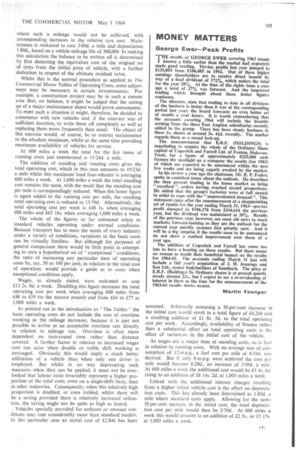MONEY MATTERS
Page 185

If you've noticed an error in this article please click here to report it so we can fix it.
George Ewer—Peak Profits THE results of GEORGE EWER covering 1963 (made 1. known a little earlier than the market had expected)
made good reading. Pre-tax profits last year jumped to £134,893 from £106,485 in 1962.Out of these higher earnings shareholders are to receive direct benefit by way of a final dividend of 17%, which makes the total for the year 28%. At the time of the rights issue a year ago a total of 27% was forecast. And the improved trading which brought about these better figures continues.
The directors state that trading to date in all divisions
of the business is better than it was at the corresponding period last year; the board forecasts an even better set of results a year hence. It is worth remembering that the accounts covering 1964 will include the benefits acruing from the three East Anglian subsidiaries recently added to the group. There has been steady business in these is. shares at around 5s. 4fd. recently. The market regards them as a sound lock-up.
The announcement that E.R.F. (HOLDINGS) is negotiating to acquire the whole of the Ordinary Share capital of Copestick and Farrell Ltd. of Fenton Stoke-onTrent, for a figure of approximately t32.4,000 cash focuses the spotlight on a company the results (for 1963) of which are expected to be announced within the next few weeks and are being eagerly awaited by the market.
In his review a year ago the chairman, Mr. E. P. Foden,
spoke in confident terms about the outlook. He described the then present trading in the home market as being "excellent ", orders having reached record proportions. He added that the group's factories were at full stretch in order to cope with the "unprecedented demand ". This statement came after the announcement of a disappointing set of results for the year ending March 31, 1963—pre-tax profit slumped to 1186,276 from 1244,616 the previous year, but the dividend was maintained at 20%. Results of the previous year, however, are soon old news to stock markets; forward-looking as they are the outlook for the current year quickly assumes first priority spot. And it will be a big surprise if the results soon to be announced do not show a marked improvement over those of a year ago.
The addition of Copestick and Farrell has come too
late to have a bearing on these results. But there seems no reason to doubt their beneficial impact on the results for 1964-65. The accounts ending March 31 last will include a full year's acquisition of J. H. Jennings and Son Ltd., motor bodybuilders of Sandbach. The price of E.R.F. (Holdings) 5s. Ordinary shares is at present quietly steady around 22s., but I expect to see a re-awakening of interest in them as the time for the announcement of the 1963-64 results draws nearer.
Martin Younger




















































































































































































































































